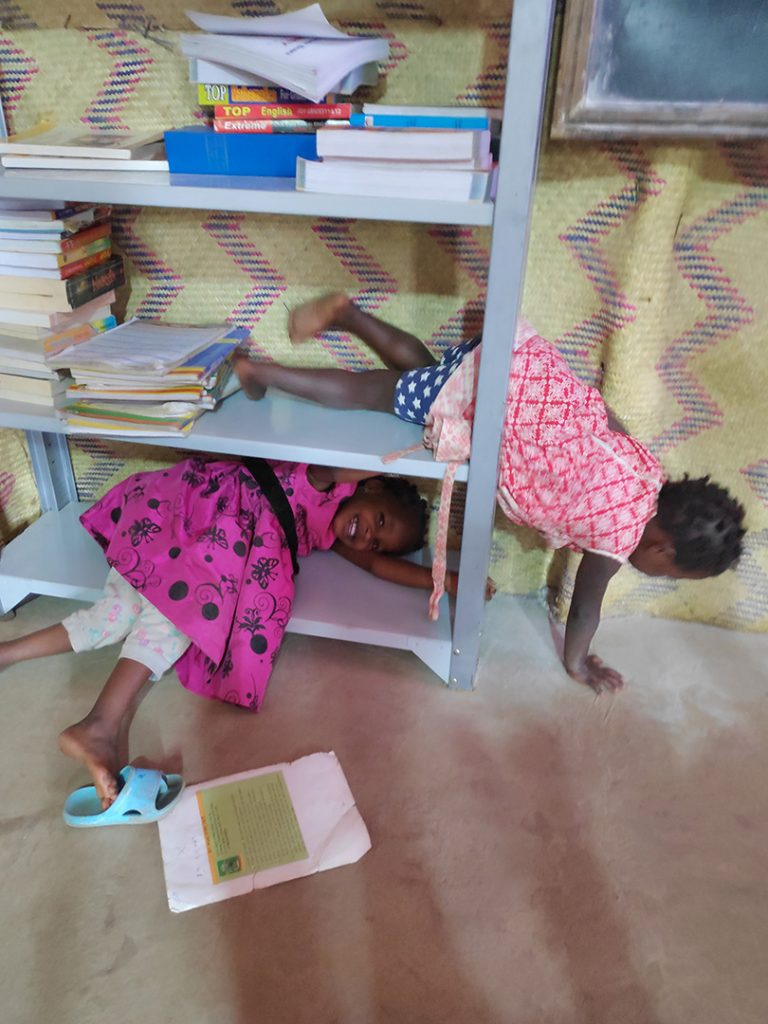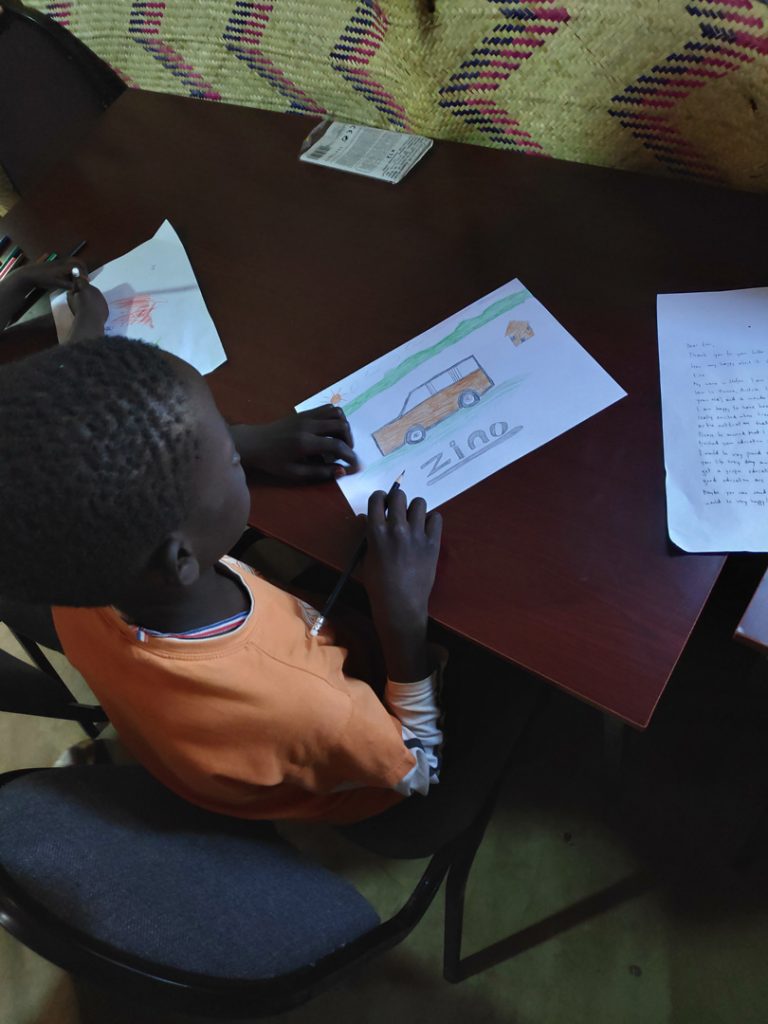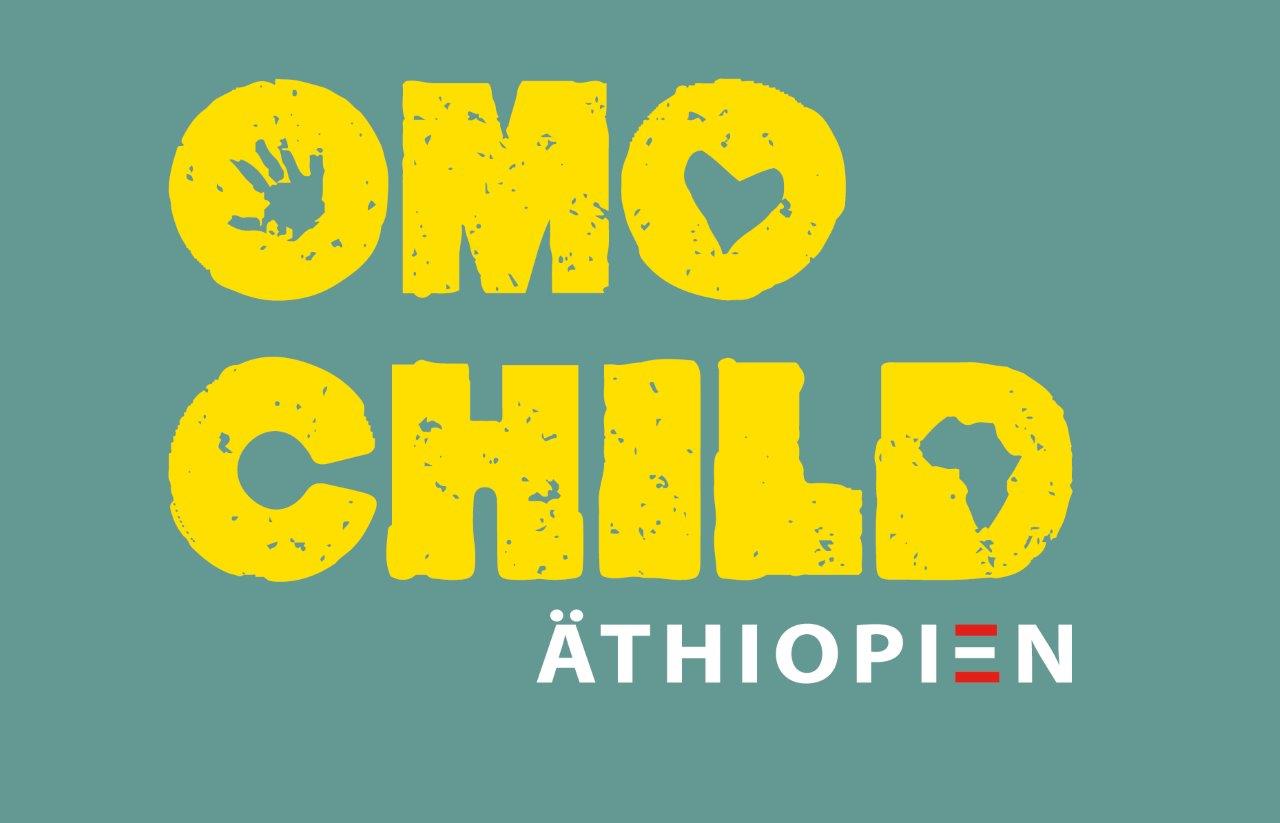TRAVELING TO OMO VALLEY
Lukas, Laurenz and Maximilian visit Lale and his children
A REPORT about an extraordinary journey
Our arrival and first few days in Ethiopia
We landed in Addis Abeba at 3 in the morning, but our connecting flight to Jinka wasn’t until 1 o’clock in the afternoon. In our search for a comfortable place to sleep we realized that it can get quite cold at night even in Africa. Finally we found a few chairs and benches where we sat down and managed to doze off for a while. We were all a bit nervous about what awaited us in Jinka. Will we be picked up at the airport? Did we make ourselves understood about the arrival times?
Around 7 o’clock in the morning the airport sprang to life again and more and more people arrived. We all enjoyed an excellent breakfast with eggs and coffee and then left for Terminal 1, where we checked in for our domestic flight. While waiting for our plane we talked to some locals, who were all friendly and were happy to ask and answer questions.
The flight went very fast – not least because all three of us spent the short hour in deep sleep. Arriving in Jinka, we waited for our luggage, which was brought to us personally by a jeep from the plane. Then came the decisive moment. Were they here now? We hadn’t seen them yet. But then as we left the building we saw Ayko and Beech, both with 2 signs with “Omo-Child” on them, waiting for us. We greeted each other and then everything went very fast. Suitcase in the Bajaj, everybody get in and off we go. We had a bumpy but unforgettable ride with the first impressions of Jinka to the Omo-Child home. Now we were finally able to meet the children. But how do you imagine getting to know 50 children at the same time? Not at all, actually. A bit shy but still smiling and very excited, they all approached us and greeted each of us with handshakes. We also got to know the Mamas, Argore – and the housekeeper or “man for everything” and Oyta. They showed us our room and then everything became a little calmer as we settled in. The kids had to go back to school after their lunch break and we drank coffee, ate popcorn and chatted about this and that. There was a lot to take in. We rested and when the children came back, it was time for us to introduce ourselves properly, assisted by a little Austrian chocolate. Ayko put together a great program for us for the next 2 days, until Lale came back from his visit to the tribes.
After an excellent dinner, prepared for us by the mamas, we went to bed. But not until we had put up the mosquito nets with the help of Argore. We talked through everything again, our first impressions, the new people we had met, etc. Everything was still completely new for us but everyone was so extremely helpful and friendly. I thought a little bit about the whole situation. I somehow still couldn’t believe we were actually here. It all started with a presentation by Lale Labuko and Robert Ebner in our school, followed by long period of planning, but now we were in Ethiopia, in Jinka, in the Omo-Child home.
The next day we were awakened at 6 o’clock in the morning by the sound of children playing outside. When everyone was back at school, the Mamas prepared breakfast for us. This consisted quite simply of bread and tea, but it was not as simple as it sounds. The combination was simply perfect and we were looking forward to this incredibly good breakfast every morning for the whole week. Shortly afterwards Ayko joined us and we discussed the program for today. A short English lesson, buying SIM cards and playing football. While the children were still in school, we prepared our English lesson for the 6th grade. To help us prepare, Ayko gave us some textbooks, from which we selected a few examples and combined them with our own ideas.
The children had school until 4 o’clock in the afternoon, so in the meantime we drove with Ayko to Ethiopian Telecom, the only telecommunications company in Ethiopia, so it has a monopoly. This didn’t have a very positive effect on the SIM card prices, but to be able to check-in at home again, we needed some internet time. We were inspected from head to toe, as if we were going through the airport security check and then questioned a bit at the counter. After all three of us had our sim cards, we went back to the home, where the children were waiting impatiently for a soccer match. Playing soccer became almost a daily ritual during the whole week, which was really a lot of fun. Shortly afterwards we also held our English lessons, where we got to know some of the children like Kulo and Abi a bit better and hopefully were able to teach them something. As the day came to an end, it was time for dinner and a delicious “injera” again. “Injera” is like a pancake with sour dough, accompanied by various sauces. Afterwards we strolled back to our room and read a bit in our books before we finally fell asleep.
On the morning of the third day we were awakened again by the excited cries of the children. It didn’t bother us either, because we could always sleep quite well, and most of the time we lay in bed for a while. Just until we couldn’t wait for breakfast any longer. After we had eaten breakfast, we prepared a little geography lesson, which we wanted to hold in the afternoon.
After lunch Ayko showed us the big market in Jinka, which is held once a week. We drove the Bajaj again and meandered through the streets where we really saw all kinds of things. Along with huge potholes, grazing cows between the roads and heavily laden trucks, a ride along the main road was both an adventure and a race. We arrived at the market, where there were a lot of locals and we were a bit out of place. Not least because we were the only foreigners and we were stared at all the time. Even though the people didn’t mean any harm at all, it was still a rather discomforting feeling to walk through the market square. In the end we only bought 3 oranges (and I hurt myself due to clumsiness when I cut them open) and then drove back home again. When we got back there was then a short rest again. Afterwards there was a tour through the kitchen where the mamas showed us how to prepare the “injera”. Like with pancakes, the dough is poured onto a hot plate or into a pan. But not turned over! The dough must rise at the top so that it is much spongier. Following the extensive cooking demonstration, we spent the rest of the day playing with the children. In between there was a small break for our lesson. But it didn’t take long until we wanted to get out and play football again, which we did until the evening. After a much needed shower and dinner, we went back to our room and discussed the forthcoming days. Above all we were looking forward to tomorrow, because then Lale would finally come back from visiting his tribe.
When we woke up the next morning and were going for breakfast, Lale came towards us and greeted us warmly. While we prepared for the day with bread and tea, Lale spent some time in the study to clarify the organizational things etc.. Since he had just come back from the Tribes, he had a lot to do. But he still had time for us. So we planned the next few days (where we could visit one of the Tribes at the end of the week) while we all sipped coffee. Today we were to visit the Jinka Museum and the bank. That was the plan for the afternoon. For the morning we let Lale do his work and played with Leka and Kacha, the two youngest OMO-Child children, who are not old enough to go to school yet. The two of them were always curious, full of energy and also liked to ask us for some chocolate. Especially with these two sweet girls it was hard for us to imagine that they would have been killed because of teeth or an unaccepted pregnancy (Mingi curse). This of course applies to the other 48 OMO children too.
In the afternoon we made our way to the Jinka Museum, where there was a collection of artefacts from all the Tribes in Ethiopia. We were brought there by Tamasgen (Tame, for short), the OMO-Child chauffeur, who did the daily shopping and took us by car to the OMO-Child home. Tame was a very funny man who spoke English quite well and made us laugh a lot. On the way to the museum, we made a short stop at the Bank of Jinka. A rather dilapidated building, but it even had a cash machine. A short time later we arrived at the Jinka Museum, where we met some tourists. After a short guided tour we went home again.
In the evening we played a few rounds of basketball with Lale and the kids, which was really great fun. Basketball is definitely his sport. His enthusiasm had no limits and throughout the match he was shouting encouragement to the other players. You couldn’t beat him either, because he’s just too tall! After a quick shower and a delicious dinner we went back to our room and fell asleep almost immediately.
Tuesday morning, our fifth day at the OMO-Child home, started again very comfortably. Following a simple – but as every morning – delicious breakfast with tea and bread, we briefly discussed the plans for the day with Lale. Today he wanted to show us the construction site of the new OMO-Child home.Since Lale still had a lot of work to do, we planned the visit for the afternoon. That was ideal for us, because we wanted to do some drawings and write some letters with the happy kids sponsored by OMO-Child Austria. When we finally found everyone and gathered them in the classroom, we tried to explain to them that the drawings were for their sponsors and that we will take them with us. Since most of the sponsored children are still relatively small and young, it was not so easy. Nevertheless everyone had fun drawing and painted several pictures for their sponsors. Of course they signed their work too, even if we had to help a little with spelling. The older ones could already write a nice letter in English, albeit with a little help.


After lunch we jumped into the car and drove to the construction site of the new home, which is not too far away. After 6 years of bureaucracy, the government had finally agreed to Lale’s application and provided OMO-Child with land to build on. The foundations for the new home had already been laid and the walls had already been built. The two houses should be able to accommodate about 100 children to start with. Lale had planned exactly how everything would look. “The study rooms must be by the large windows so that one can keep a clear head […]” – Lale. There was also a large water tank so as not to constantly depend on the daily water supplies. A new kitchen for the Mamas and a large dining room have alreadybeenbuilt.Lale isalready planning aschool for the OMO-Child kids, which will be the next project . That’s because the schools in Jinka are all overcrowded, the teachers not very well trained and also completely overwhelmed. After Lale told us about all his plans, I kept thinking about the motivating and joyful statements written on the walls of the children’s home, like “The OMO children will be the future leaders of southwest Ethiopia”.
When we got back, we played another game of football before we rushed in to dinner. All three of us were looking forward to the following day, because we were going to visit the Tribes with Lale.
Today was the day! We would drive a little further into the savannah and visit the tribes (one of the main reasons for many tourists to come to Ethiopia). Even though we were here for Omo-Child of course, we were happy to be able to arrange this little trip with it. We planned to stay there overnight and return the next day in time for a final dinner together with the whole Omo-Child family. After we packed our backpacks, Max had all the camera equipment together and Luki briefly did his English intensive course with Kulo (one of the older kids) – he had a small examination the same day – we made ourselves comfortable in the car. It was a pretty long and bumpy ride as the roads got worse and worse as we got further away from the city. When we arrived in the afternoon and immediately left our luggage in the hotel, we drove with a friend Lale`s to the tribe of their own family. They all welcomed us and were pretty curious about our cameras. The mother even offered us a kind of tea-coffee mixture, which she served in small wooden bowls. We watched the hut, the goats and the humble lives of the tribesmen and in the meanwhile Tame, the driver, showed the kids funny music videos.
After sunset, we got back in the car and made our way back to the hotel where Lale was already waiting for us, doing his work. We all ate dinner together, talked about today’s experiences and then retreated to the rooms. In our room a small plague of insects awaited us, which was to be expected in the heart of Africa. Somehow, we managed to ignore them and after the electricity failed, nothing kept us from sleeping.
TO BE CONTINUED…
YOU CAN HELP TOO
Through sponsorship, you will not only ensure that a child is looked after, you will also be looking after the child´s future.
